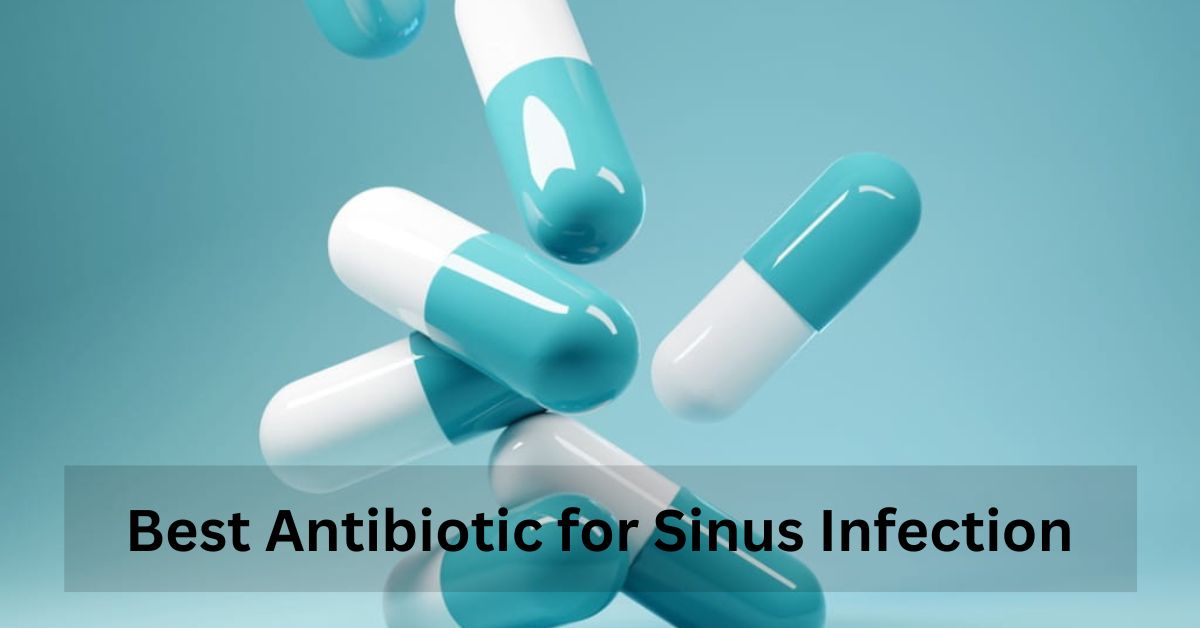Best Antibiotic for Sinus Infection
Sinus infection, this problem is seen in about 70-80% of people. If sinusitis is a problem, then it is much more uncomfortable. Many people start thinking about what medicine to take as soon as sinus pain arises. Some people buy antibiotics from a doctor or a nearby dispensary. Sometimes, Antibiotics do not work for sinus infection problems. If you want to know more about the Best Antibiotic for Sinus Infection, please scroll down.
What is a sinus infection?
Table of Contents
Inflammation of the air cavities in the nasal passages (paranasal sinuses) is referred to as sinusitis. Sinusitis can cause an infection (sinus infection) and is driven by sinus allergies and chemical irritation. A sinus infection (infectious sinusitis) occurs when a virus, bacterium, or fungus grows in a sinus.
Sinus infection is one of the most common conditions that can afflict a person for a lifetime. Sinusitis usually occurs when environmental pollen irritates the nasal passages, such as high fever. Sinusitis can also cause inflammation, such as the use of chemicals or over-the-counter (OTC) nasal sprays and illicit substances that can cause a runny nose or shortness of breath. Here you will learn about the Best Antibiotic for Sinus Infection.
About 30 million adults have “sinusitis.” Colds are different from sinusitis and are caused by viruses only and last for roughly seven to 10 days. Still, sinusitis can have various causes (infectious and non-infectious) and is usually chronic with more evident and variable symptoms.
Causes sinus infections
Sinus infection or sinusitis can be caused by something that interferes with the sinuses’ airflow and removes mucus from outside the sinuses. Sinus opening (Ostia) may be obstructed by tissue lining and adjacent nasal passage tissue swelling, for example, such as:
- Common cold,
- Allergies, and
- Tissue irritation such as OTC nasal spray, cocaine, and cigarette smoke.
- Also, dehydration
- AIDS
There are four pairs of these human cavities, each called:
- Frontal sinus (forehead),
- Maxillary sinus (behind the cheek) as well as
- Also, the Ethmoid sinus (between the eyes) and
- Sphenoid sinus (deep behind the ethmoids)
Types of sinusitis
- Viral sinusitis
Antibiotics are not needed for viral sinusitis. Often the recommended treatments include pain and fever.
- Acetaminophen [Tylenol])
- Decontaminants and mucolytics are actions that dissolve or break down mucus, for example, guaifenesin.
- Bacterial
Bacterial infections of the sinuses are suspected when facial pain, nasal discharge, pus-like appearance, and other symptoms persist for more than a week. Over-the-counter (OTC) nasal actions do not respond to sedation.
Acute sinus bacterial infections are usually treated with antibiotics to treat the most common bacteria known as the cause of sinus infections. It is unusual to find a reliable culture without aspiring to the sinus.
- Streptococcus pneumonia
- Haemophilus influenza
- Moraxella catarrhalis
- Staphylococcus aureus
- Streptococcus pyogenes
See also Symptoms of MS in Women
Symptoms
- Sinus headache,
- The softness of the mouth,
- Also, pressure or pain in the sinuses of the ears and teeth,
- Fever,
- Also, cloudy-colored nasal or postpartum drainage,
- Besides, the feeling of nasal satisfaction,
- Sore throat as well as
- Cough, and
- And, Occasional swelling of the face
Symptoms of a bacterial sinus infection
- Mouth pain,
- Also, nasal discharge like pus and
- Besides, symptoms that persist for more than a week do not respond to over-the-counter (OTC) nasal sprays.
- Sinus infections are usually diagnosed based on the patient’s history and physical examination.
- Bacterial sinusitis is usually treated with antibiotics. Early treatment of allergic sinusitis can prevent secondary bacterial sinus infections.
- Home remedies for sinus infections include over-the-counter (OTC) medications. Such as:
- Acetaminophen (Tylenol and others),
- Decongestants
- Mucolytics
- Besides, An emergency treatment of rare fungal infections of the sinuses (e.g., zygomycosis).
- Complications of sinus infections include meningitis, brain abscess, osteomyelitis, and orbital cellulitis.
- Also, there is no fungal vaccine to prevent fungal sinus infections.
What are antibiotics?
Antibiotics are bactericidal drugs that inhibit the growth of competitive microorganisms from naturally occurring bacteria. Chemicals produced by mold from penicillin were invented by Alexander Fleming in 1929 and contained the popular derivative amoxicillin.
Acute bacterial sinusitis will resolve without treatment, which percentage is 60%. Antibiotics were routinely shown to shorten the disease’s course and reduce the frequency of complications from sinusitis
When should antibiotics be used?
After the first week, for acute bacterial sinusitis, antibiotics are recommended for more than ten days or bad. The most common symptoms include:
- Facial pain or pressure,
- Besides nasal congestion or congestion,
- and dense,
- Also, faded nasal discharge.
Antibiotics are also commonly prescribed for chronic sinusitis, although most cases of chronic sinusitis are not bacterial.
Sinus Problems: Do Antibiotics Help or Hurt?
Patients with painful sinus problems often ask their physicians to give them the antibiotic ASAP.
Studies have shown that about 90% of adults seen in the United States by a general practitioner find antibiotics for acute sinusitis.
Besides, acute sinusitis is a sinus infection that lasts less than four weeks. Chronic sinusitis lasts more than 12 weeks. Viral or bacterial infections usually cause sinus infections, and air gaps in the bones of the cheeks, forehead, and between the eyes. However, they cause dense mucus blockage and discomfort in the thesis cavity.
However, according to recent research and medical experts, antibiotics may not always be the best cure for sinusitis. Your body should be able to cure mild or moderate sinusitis and avoid antibiotics that may cause antibiotic resistance.
The Strange Use of Antibiotics has now been issued jointly with the guidelines issued by the American Academy of Allergy, Asthma, and Immunology, the American Allergy College, and the Joint Council of Asthma and Immunology and Allergy.
Best antibiotic for sinus infection
Many people choose to take antibiotics for sinus problems. Although it does not work in all cases, some antibiotics can reduce sinus pain after eating. Although sinus pain is not entirely curable, most of the time, these antibiotics give us relief. Relief is available from pain. So below are the names of some antibiotics that anyone can use.
-
- Amoxicillin: Amoxicillin remains the drug of choice for acute, problematic bacterial sinusitis. Amoxicillin is most effective when given in adequate amounts frequently to maintain sufficient levels in infected tissues. Although often prescribed twice daily, it is more effective when taken in 3 or 4 divided doses. Even after criticizing the completion of a full 10-day course of antibiotics when treating strep throat, there is evidence that a short period of treatment may be sufficient in most sinusitis cases. The amoxicillin parent mixture is closely related to penicillin and should not be prescribed in patients with penicillin allergy.
- Azithromycin: Azithromycin is an alternative treatment for patients allergic to amoxicillin. The main advantage of azithromycin is the advantage – the recommended treatment for acute sinusitis is 500 mg once daily for only three days. Azithromycin induces early resistance to antibiotics if given in shallow doses to reduce bacteria. This resistance lasts at least three months.
- Cephalosporins and Augmentin
- Cipro, Levaquin, and Avelox
- Bactrim and tetracycline
- Topical antibiotics
See also President Obama Holds His Final Press Conference
Penicillin allergies and treatment for sinusitis such as:
- Loracarbef (Lorabid)
- Clarithromycin (Biaxin)
- Sulfamethoxazole (Gantanol)
- Trimethoprim (Bactrim, Septra)
- Ciprofloxacin
What is antibiotic resistance?
Bacterial antibiotic resistance is a significant problem across Richmond, Virginia, and throughout the United States. Many common bacteria can cause sinusitis to carry a gene for antibiotic resistance that can be introduced in the presence of antibiotics.
After a few days of treatment, the gene becomes active and can even travel between bacteria (in a capsule known as a plasmid), creating resistance in large populations of bacteria. If you do not respond to a course of antibiotics within 4-7 days, you may have a resistant strain of bacteria. Consult your physician for a test and possible culture or DNA analysis of your sinuses.
DNA analysis of the sinus drain allows us to identify the most dangerous resistant strain within 24 hours and provide a complete analysis of all the bacteria in your nose within one week.
The doctor does not prescribe antibiotics over the phone
80% of patients with acute sinusitis can improve on antibiotics within a week shown in studies, while 733% of patients will improve by placebo. Moreover, antibiotics can do nothing to get rid of the common cold. Excessive use of antibiotics can reproduce resistant strains of inducing drug allergies and bacteria in susceptible patients.
Accordingly, a doctor never recommends antibiotics for sinus signs that appear to improve spontaneously within the first 7-10 days. If you are abusing antibiotics now, we have no choice when you need them!
How should you treat sinus infections?
Most people recover from a cold-related sinus infection in about a week, but some self-help measures may soon bring some relief:
- That is especially important in the first few days when your body needs to be energized to fight the virus. Postnatal drip helps to improve your head while lying down for comfort.
- Drink- Warm fluids help to thin the nasal secretions and loosen the liver.
- Increased humidity- A bath, light warm air from the shower, or a pan of freshly boiled water can loosen the cough and soothe the throat.
- Gargle. Use half a teaspoon of salt in a glass of hot water
- Rinse your nose – Saltwater sprays or nasal irrigation kits (such as Neti pots) can make you feel better.
- Use over-the-counter remedies with caution.
- Oxymetazoline nasal sprays or sprays (such as Otrivin, Drixoral, and Generic) can cause rebound congestion if used for more than three days.
- The benefits of oral decongestants (such as Sudafed) are far less than the risks of side effects.
- If significant allergies are not present, it is best to avoid antihistamines because they do not relieve the cold symptoms quickly and can cause harmful side effects.
Home remedies for Sinus Infection
Viral sinus infections can be treated at home (over-the-counter, OTC) using medications. Such as pain and fever actions (acetaminophen decongestants and mucolytics). Also, some healthcare professionals recommend nasal irrigation or a sinus wash to relieve the symptoms of a sinus infection, even the symptoms of chronic sinusitis.
This irrigation is done with a “neti-pot” or a sinus wash kit (sometimes known as a nasal bidet). The last mention of this article shows a video of a sinus-washing procedure. The FDA warns people not to use untreated tap water for pitchers, as washing contaminated tap water can lead to two deaths.
Bacterial and fungal sinus infections usually require antibiotics or antifungal therapy, so home treatment without them is often not successful. However, some authors suggest that home treatments may reduce symptoms after the onset of treatment therapy; Some healthcare professionals recommend nasal irrigation after sinus surgery
Complications
Serious complications do not occur frequently, but sinus infections are more likely to be transmitted directly to the brain through the sinus wall, which creates a life-threatening emergency (for example, meningitis or brain abscess). Besides, other adjacent structures can become infected and develop problems
Rarely, these infections (mainly bacterial and fungal organisms) can cause death. People who are most susceptible to complications are more likely to be immune to disease, diabetes, and relatively rare multiple trauma injuries resulting in natural disasters.
Is it preventable?
However, vaccines against viruses (influenza) and bacteria (pneumococci) can cause some contagious sinusitis.
Vaccination against pathogens known as the cause of infectious sinusitis may indirectly reduce or prevent this disease’s development; however, no specific study supports this hypothesis. Fungus vaccines against sinusitis are not currently available
If you are at risk for recurrent trends of “annual sinus infection,” it is essential to consider allergy testing to see if it is an underlying cause of recurrent problems. See Allergy Treatment Can Prevent Secondary Bacterial Sinus Infections
Final Word
From all the above information, we all know that no antibiotic is needed for sinus infection whether the antibiotic works for the sinuses, the best antibiotic for sinus infection, and details by reading this content.
Frequently Asked Questions on Best Antibiotic for Sinus Infection
Q1.What Is The Strongest Antibiotic For Sinus Infection?
Ans. Amoxicillin and Azithromycin are the two most common and strongest antibiotics for sinus infection. Although sinus pain is not completely curable, after completing a full course of these antibiotics, patients experience relief from the pain for a limited period of time.
Q2. Is 5 Days of Amoxicillin Enough For Sinus Infection?
Ans. The number of days Amoxicillin should be given depends on the severity of the patient’s infection. Typically, depending on age, weight, and severity of the infection, amoxicillin is given for 5 to 7 days for sinus infections.
Q3. Is Augmentin Used For Sinus Infections?
Ans. Yes, Augmentin is used to treat sinus infections. It may take three to four days for the antibiotics to take effect.











